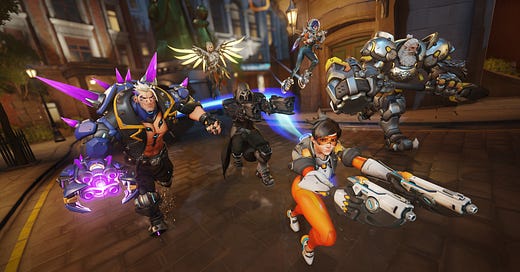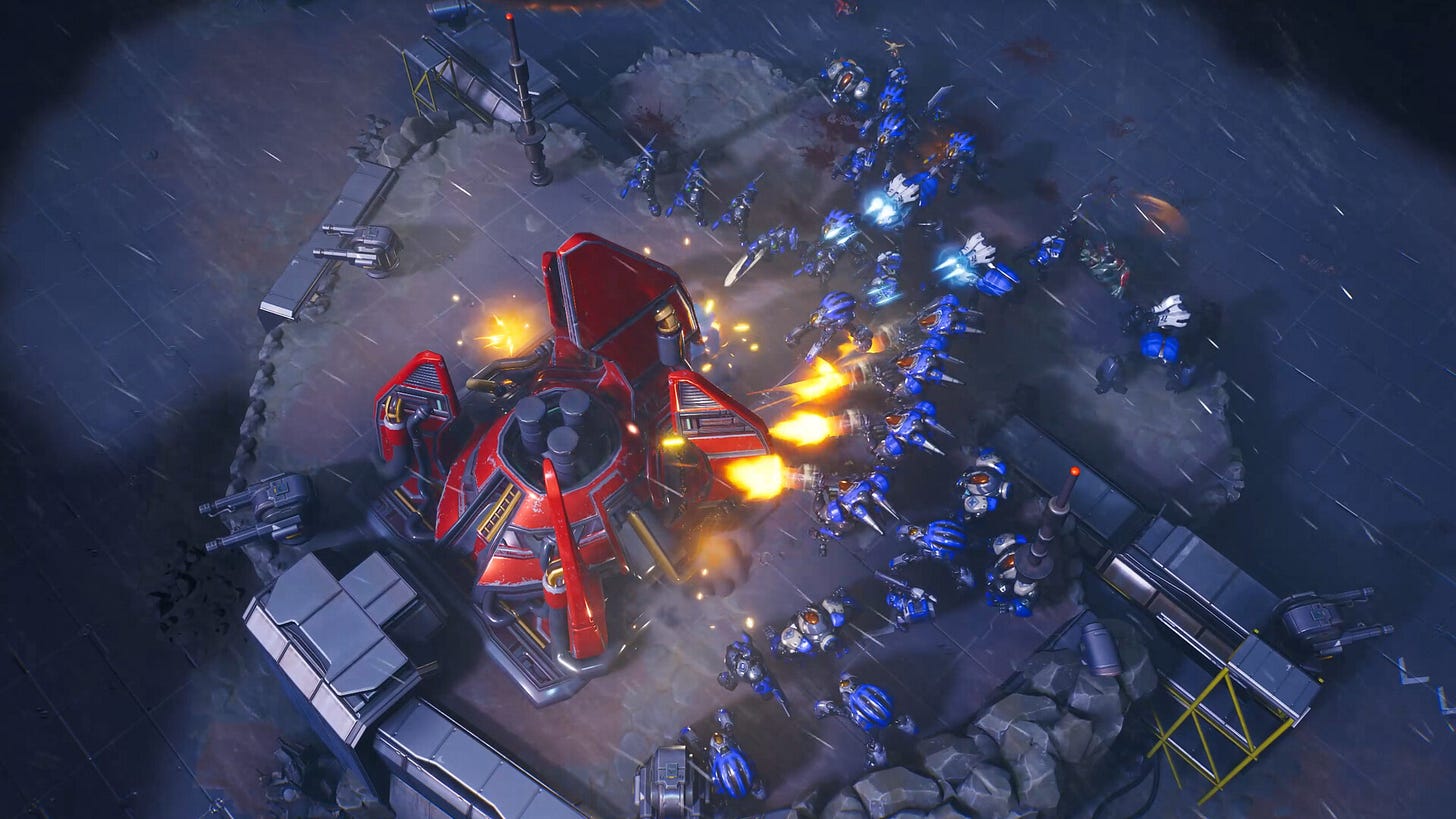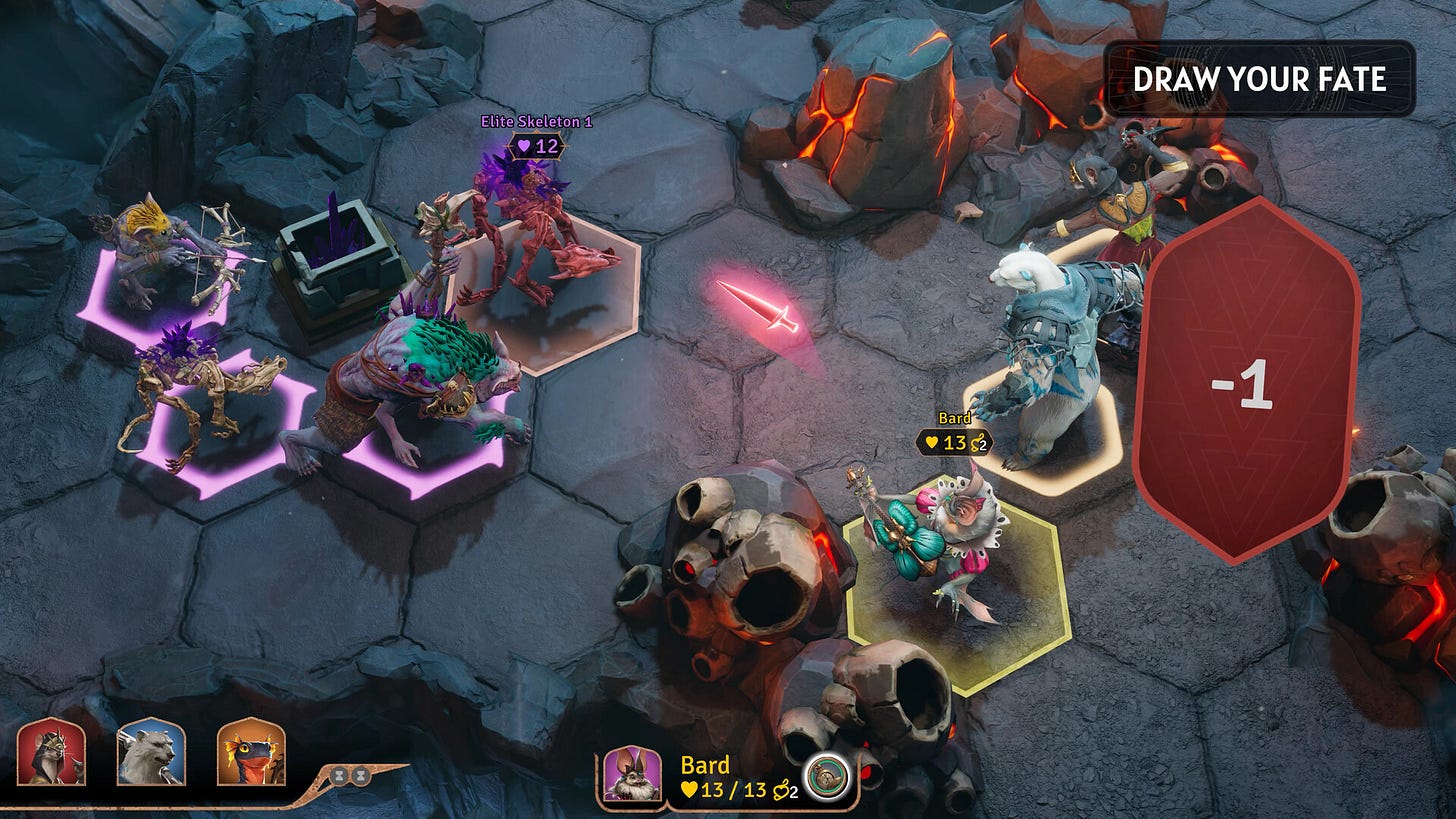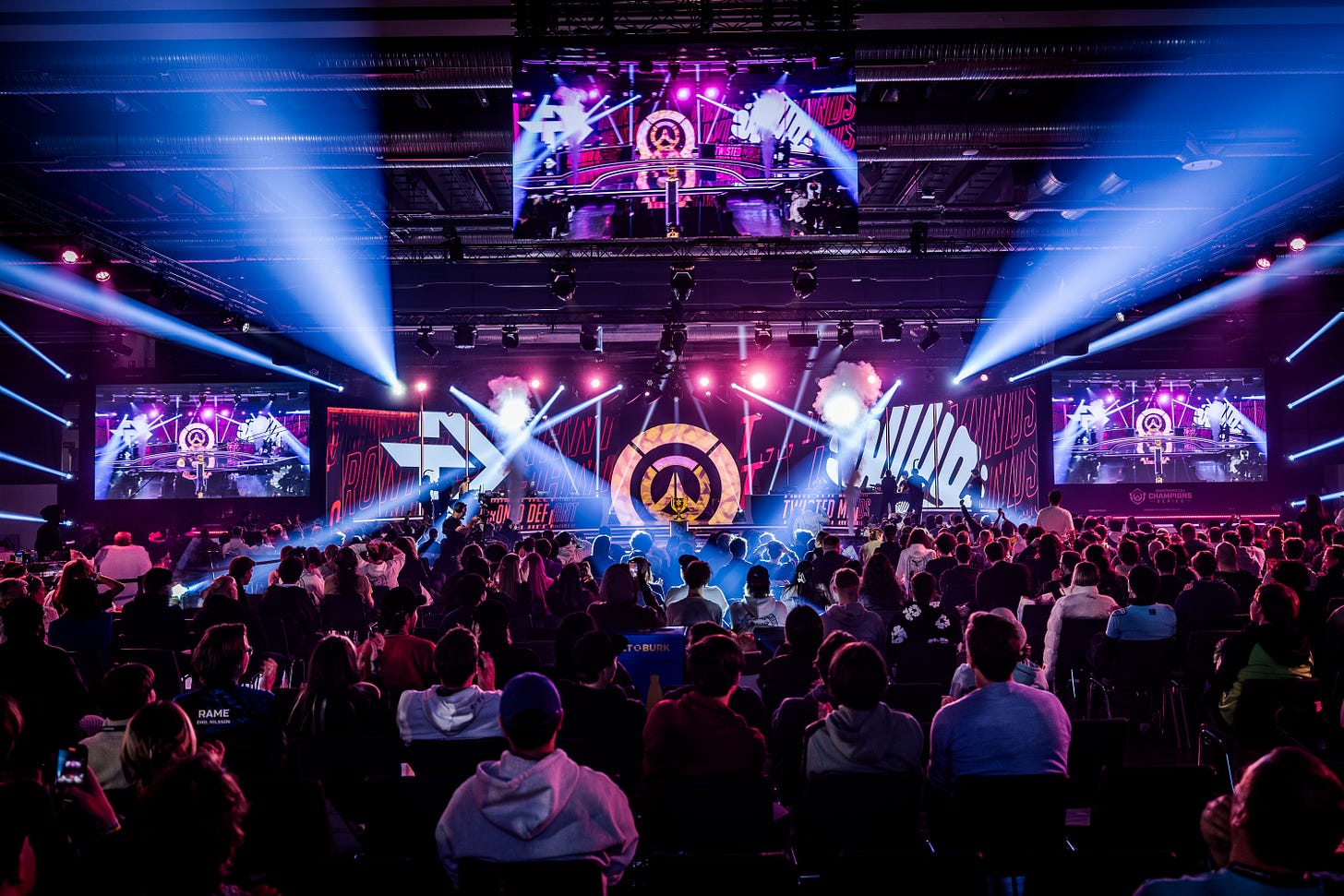Why do Blizzard games feel so special?
Can any of the storied studio's spin-offs replicate the magic formula?
My guest for this issue of Multiplier is Seamus Byrne. Seamus is an award-winning journalist, editor and broadcaster. He’s written for so many places it’s hard to know where to start. He’s a former editor of Gizmodo Australia, CNET Australia, Innovation Australia and more. These days, he’s kept plenty busy as the co-founder of Byteside. You can find and follow Seamus on Bluesky.
Fergus: While the history of video games is littered by auteurs, innovators and figureheads, it’s relatively rare for an entire studio to attain the same kind of mythic status. Sustaining it for decades is even harder. For the longest time, Blizzard Entertainment was one of those lucky few names in gaming. With megahits like Warcraft, Starcraft and Diablo to its name, it was the studio that could afford to take as long as it wanted to make the games it wanted to make because it had a track record of that bet paying off.
While its future under Microsoft is still to be written, it’s safe to say that Blizzard isn’t the same company it once was. For various reasons both cultural and corporate, most of those who built the studio and its values up have now left it behind. Successor startups like Frost Giant, Dreamhaven and others are now looking to court both investors and consumers with the promise to go back to the good old days. But what are we really talking about here? What made Blizzard Games special and how likely is it that we’ll see one of the studio's many heirs capture the same kind of ‘lightning in a bottle’ success?
Seamus: I've always been a sucker for Blizzard's ability to tell cool stories through and around its games. What made Blizzard special? Putting really well polished gameplay experiences into epic game worlds with lots of lore that extends way beyond what you see in the game. I've been a fan since the early Warcraft RTS era into Diablo and StarCraft. And for a long time there was probably a good argument that they nailed three IPs and then just did a good job building on and around those.
I think Overwatch was really important for the legacy of Blizzard. For all the ups and downs of launching OW2, the original game launch really did show that Blizzard still held the power to introduce a fantastic gameplay experience with an associated world that held great storytelling potential. The fact it was mined from the ashes of a failed MMO project probably deserves bonus marks – they had people who saw potential for story and gameplay in something they'd worked on but had to walk away from.
Hearthstone was also a great launch that leveraged Warcraft IP but lived or died by being a great digital card game. So the team still had the ability to bring its understanding of polish and gameplay flair into another game category. Was there even any other good digital card games at the time?
I felt like I needed to talk that out to think about why all the other studios launched by ex-Blizzard devs have struggled. There's been a lot, and I can think of only two that have ever delivered something that is more than a forgotten dream. ArenaNet, maker of Guild Wars, was started by ex-Blizzard folks in 2000. And Second Dinner, founded by Ben Brode and Hamilton Chu, have made Marvel Snap.
Plenty of hotly anticipated studios have really struggled to find an angle. When I look at Frost Giant and Stormgate, I'm not sure how it'll turn out better than, say, Carbine Studios' Wildstar. I enjoyed a bit of Wildstar but it didn't give me a reason to play it instead of WoW. The gravity of existing communities on the Blizzard games means you need to be a LOT better if you want to convince a big chunk of that community to come to your game and stick around long term.
Torchlight was actually great, but not really a commercial hit. And the biggest hype I remember was in 2016 when Rob Pardo, former Chief Creative Officer of Blizzard, started Bonfire Studios. Backed by Riot Games and Andreessen Horowitz… eight years later… not even a hint of a first game.
There's more, of course, but I guess we've really hit endgame territory with Mike Morheim's Dreamhaven. The longest CEO of Blizzard finally left because he couldn't deal with Bobby Kotick anymore. If anyone can bottle the magic it's gotta be Mike, right? We finally have a first trailer for a Secret Door game (one of the Dreamhaven studios) and Sunderfolk looks interesting. What I like is that it is totally different – boardgame inspired couch co-op strategy that you play through your phone? I'm pleased their first game isn't just another MMO or RTS or ARPG.
I think if Morheim's gang can't find The Way, nobody can. I also noticed that J Allen Brack and Jen O'Neal have started Magic Soup Games this year too? But I just don't think they bring 'the juice' that Morheim has in his bones, so Dreamhaven really is the final boss of "What made Blizzard special?" spin off attempts.
Fergus: I’d agree that of all the ex-Blizzard projects I’ve taken a serious look at, Sunderfolk stands out as the most refreshing and original one. Dungeons & Dragons is bigger than ever, as are campaign-based board games like Gloomhaven. Making (parts of) that experience more accessible and low friction is a move right out of the Blizzard playbook.
But alongside the polished gameplay and epic worlds you mentioned, the less flashy third pillar of Blizzard’s approach was always that emphasis on community building. When I think about how long I’ve spent with this or that Blizzard game in the past, one of the most important constants is the social dimension of that playtime. World of Warcraft is the most obvious example, of course. It’s far from the only one though. Diablo, Overwatch, Hearthstone and even Starcraft all get a lot of their staying power from the fact that you can play them with your friends or online competitively.
Although that doesn’t sound like all that much of an X-factor nowadays, it’s hard to disentangle the effect it might have had on turning Blizzard’s more run-of-the-mill commercial successes into outsized and genre-defining ones. I don’t think it’s as random as luck or as simple as being in the right place at the right time, but the success of Warcraft writ large owes a lot to it being one of the first gaming franchises to embrace the signal boosting powers of the internet. More than that, it had the opportunity to capitalise on that force multiplier more than once.
That’s probably not the only reason that most of the studios spawned by former Blizzard folks fail, but it’s hard not to suspect it might be a big one.
Seamus: It's funny, I kind of brushed over my 'gravity' comment about community but you're right to really emphasise it is truly a pillar of their approach. They've cultivated a balanced scene for casuals, for hardcore PvPers, for lore nerds, and they've acknowledged and evolved their approach to community over time. It's rare a company recognises that their fans are not eternally one age – they've shifted and discussed that the players who once had a lot of time to sink into WoW grew up and have families and needed better systems that were friendlier to just dropping in irregularly.
BlizzCon is certainly a community event like no other. QuakeCon is maybe the closest thing like it. I only ever went once to BlizzCon, in 2019, and they had the Overwatch World Cup, the Hearthstone World Championship, StarCraft WCS Global Finals, WoW Arena World Championship… and then so many great panels and Q&As that gave fans great access to devs. Even when I wasn't there in person I always bought the digital pass to watch the panels.
But community is also the biggest fear I have right now for the future at Microsoft. Look at 2024 and it's that fear as a reality. No BlizzCon in a year that would have been BlizzCon worthy – a Diablo IV expansion and the 30th anniversary of Warcraft. OK, maybe they wanted a lot more to talk about… the job losses and transition into Microsoft might have delayed a bunch of activity into 2025. But then I really haven't been able to overlook the fact they also said "No BlizzCon, but don't worry, we are planning multiple global in-person events to celebrate the Warcraft 30th anniversary." That just never happened either so it feels like the new parent kicked the Blizzard community twice.
Editor’s note - In the time between Seamus and I having our little chat in December 2024 and this issue of the newsletter going live, Blizzard has gone and announced further details for the slew of in-person events celebrating 30 years of Warcraft.
Microsoft's whole Game Pass strategy was in trouble right around the time they were wrapping up the Activision Blizzard deal and now they're trying to solve how they recoup the massive expense. Sony has absolutely crushed Microsoft in the current generation and Xbox is at sea. The "everything is an Xbox" pivot is underway but where does that leave a Blizzard? It feels like Xbox could learn a lot from Blizzard on community development but instead it seems like the biggest ever acquisition in Microsoft corporate history is a spreadsheet problem.
Maybe that's where the door opens for those new ex-Blizzard studios? If Blizzard loses community focused budget lines does some of the magic fade in the years ahead? Warcraft will Warcraft basically forever, but every other franchise feels like it needs more community engagement to avoid the stagnation that hit StarCraft. And when the first ever microtransaction horse released for WoW earned more than StarCraft II ever did you can see the new accountants deciding that all they really bought was Call Of Duty and Warcraft. And that means, long term, players might have to look elsewhere for the Blizzard vibes of yesteryear?
Fergus: Yeah, at this point it’s so hard to read the tea leaves and try and discern what lies ahead for Blizzard Entertainment. Building and then maintaining a community like the one surrounding the studio has pretty big benefits, but it’s always probably going to be hard, expensive, slow and difficult to sell to your corporate overlords. It’s easy to ask whether these resources have been better spent going into the game itself but tricky to imagine whether Blizzard’s stable of franchises have the same staying power without the sustained sense of community attached to them.
Riot Games is probably a close cousin of Blizzard Entertainment when it comes to harnessing the power of that phenomenon but they’re far from the only example of what this can look like.
Arrowhead haven’t yet dabbled with in-person events like Worlds or Blizzcon but it’s hard to understate how having an active and growing community has fueled their rapid rise following the release of Helldivers 2 earlier this year. Meanwhile, Second Dinner’s Marvel Snap sidestepped the problem to a degree by being able to tap into the wide appeal that comes with the Marvel license.All this is to say that, for the likes of Frost Giant and Dreamhaven, building a good game might end up being the easier half of the puzzle.
Seamus: I think you're right that the easier part for these ex-Blizzard folks is making a really good game. They've worked at a company that, for its various issues over recent years, really has an amazing execution pipeline. Learning how to be part of a team that knows how to nail that level of polish and gameplay experience has to be a huge advantage over never having been in that kind of system. I don't think I've ever seen a game from one of these much vaunted spin-off studios that doesn't have plenty of those little hallmarks that makes you think "this has Blizzard energy".
The community issue is always whether the bosses think it's a cost centre or an investment. It's hard to track the ROI but as a fan / pundit it also seems like some of the best marketing dollars you can spend with a very long term return if you do it right. To twist the gravity metaphor, maybe achieving the community you need for long-term commitment is like getting into orbit. It's one thing to slowly build that capability and turn a few small pods into an operational space station. From there it doesn't take as much ongoing input energy to keep it up there – but you do still have to respect it and feed it and run solid maintenance based on the expectations you've set.
If you're trying to catch up to a competitor who is already up there? You need to invest a LOT to chase that down fast. Players aren't going to be patient about an experience that doesn't include a great community. Helldivers 2 feels like something of a miracle! So in that sense it's Blizzard's game to lose. Or for Dreamhaven to be comfortable playing a very long game. Or for Morhaime to really open up his wallet.








